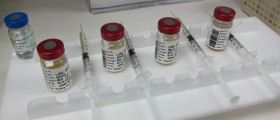
An allergy can be easily defined as an abnormal reaction of the immune system towards some foreign substances or particles. Substances that are actually not harmful to the body become very dangerous and even the smallest amount of them may trigger an allergic reaction which sometimes may even be fatal. The substances to which a person develops an allergy are called allergens. There are numerous allergens present. While some people are allergic to pollen, hay, or dust mite there are also people who develop abnormal immune system reaction once they are administered some medications.
During the initial contact with the particular drug the body acts in such a way to produce specific IgE antibodies. This is a so called sensitization. There is no abnormal reaction during this contact and the symptoms and signs only develop after repeated exposure to the drug. It is then when the already synthesized IgE antibodies go into action, release large amounts of histamine and precipitate various symptoms and signs.
Information on Drug Allergies
There is a whole variety of symptoms and signs one may develop once exposed to a particular allergen. They are either mild and well tolerated or may become life-threatening. It is possible to experience an upset stomach after intake of the drug but is more common for one to develop skin rash, hives, itchy skin or eyes and congestion. Swelling of the throat and mouth occur in more complex cases. Severe allergic reactions are characterized by breathing difficulty, cyanosis, dizziness and/or fainting, anxiety, confusion and rapid pulse. Nausea, diarrhea and abdominal disturbance may occur as well.
Most symptoms and signs of an allergic reaction develop within 1-72 hours after introducing the allergen into the body. The most severe allergic reactions are definitely toxic epidermal necrolysis which is characterized by skin that peels and is covered with numerous rather large blisters and anaphylaxis, a life-threatening condition that triggers breathing difficulty, changes in pulse and heart rate, a sudden drop in pressure and other health issues.
Even though practically any drug can precipitate allergic reaction there are certain medications whose structure is the one blamed for being more effective in triggering allergy in the first place. For example, people seem to be most allergic to penicillins. Apart from penicillins people may become allergic to sulfa drugs, barbiturates, anticonvulsants, Aspirin and non-steroid agents. Allergy to contrast dye material and vaccines are also among frequent types of allergies.
Once the allergy to a particular drug develops, it remains for the rest of patient's life i.e. the person should stay away from the drug in question in order to avoid abnormal body's reaction. Also, it is confirmed that people who have already become allergic to one drug are highly likely to develop allergy to other medications as well. This is the reason why doctors must be rather careful when prescribing a new drug to such individuals especially if the drug itself is commonly triggering allergic reactions.
Importance of Education on Drug Allergies
It is essential to know whether you are allergic to some drug or not. However, it is never possible to confirm the allergy until the symptoms and signs first occur, typically after the second exposure to the allergen. Being familiar with drugs the person is allergic to makes him/her be more cautious when taking other medications as well. Doctors always need to know to what drugs their patients are allergic to and avoid prescribing these.
The only way to confirm the allergy is to perform a skin test. Now, the test is highly efficient and will confirm the allergy. Additionally, patients undergo a blood test or certain other tests depending on the allergy and accompanying symptoms and signs.
As far as treatment for drug allergy is concerned it is essential to call 911 immediately if there are breathing difficulty and hives. Treatment for severe allergic reactions always takes place in an emergency room with the assistance of intravenously administered drugs and fluids. For instance, a shot of epinephrine is vital for patients who cannot breathe. Antihistamines and corticosteroids are administered as well.
On the other hand, mild allergic reactions are treated at home. Patients are basically prescribed topical antihistamines for skin changes. These medications can be also taken orally. They do cause drowsiness but are very efficient against many problems such patients have to deal with (e.g. skin rash, hives etc.).
For people who simply depend on the drug they are taking doctors may recommend a method called desensitization. During the process of desensitization patents receive small amounts of the drug responsible for the allergic reaction. The dose is then slightly increased and by doing so the immune system gets used to the drug.
Finally, those individuals who are confirmed to suffer from allergic reactions that mighty be lethal are supposed to have an allergy kit that contains an epinephrine shot at hand. Such patients are also taught how to give themselves a shot if necessary. It is also recommended that these patients wear a medical alert or other jewelry that lists the drug allergies the person is suffering from.
All in all, although drug allergies are a common problem and they affect many people, they can be avoided and even if they occur by timely treatment one's live can be saved.

















Your thoughts on this
Loading...